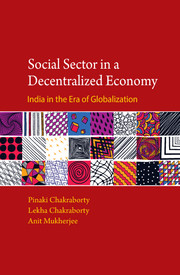Book contents
- Frontmatter
- Contents
- List of Tables, Figures, Boxes and Appendices
- List of Abbreviations
- Preface
- 1 Unpacking Decentralization
- 2 Decentralization in Service Delivery: Empirical Evidences
- 3 Decentralization in India: History, Laws and Politics
- 4 Local-level Fiscal Decentralization: State Finance Commissions and Devolution
- 5 Decentralization of Education
- 6 Decentralization in Health Service Delivery
- 7 Measuring Benefit Incidence: Health and Education
- 8 Effectiveness of Decentralization on Service Delivery: Accountability and Efficiency
- 9 What We Have Learnt and the Way Ahead
- Bibliography
- Index
Preface
Published online by Cambridge University Press: 26 September 2017
- Frontmatter
- Contents
- List of Tables, Figures, Boxes and Appendices
- List of Abbreviations
- Preface
- 1 Unpacking Decentralization
- 2 Decentralization in Service Delivery: Empirical Evidences
- 3 Decentralization in India: History, Laws and Politics
- 4 Local-level Fiscal Decentralization: State Finance Commissions and Devolution
- 5 Decentralization of Education
- 6 Decentralization in Health Service Delivery
- 7 Measuring Benefit Incidence: Health and Education
- 8 Effectiveness of Decentralization on Service Delivery: Accountability and Efficiency
- 9 What We Have Learnt and the Way Ahead
- Bibliography
- Index
Summary
In this book, we will analyze the process of decentralization in India and examine its effectiveness on health and education service delivery. Against the backdrop of theoretical and empirical evidences, the book examines the accountability frameworks of decentralization in public service delivery and arrives at a plausible public expenditure benefit incidence in health and education sectors in India. This book is contextual against the current debates on the significance of ‘co-operative federalism’ in efficient public service delivery.
The core objective of the book is to widen the debates on decentralization away from the restricted domain of public finance towards the human development impacts of decentralization process. In India, the literature on decentralization revolves around the fiscal issues like intergovernmental transfer mechanisms, tax effort at local level, expenditure assignments at the third tier, etc., and these studies surpassed the effectiveness of the decentralization process on public provisioning of services. The analysis of this book is carried out by distilling the existing studies on the subject as well as the analysis of public finance statistics of India and household survey statistics in understanding the utilization or incidence of the public spending on health and education.
A priori decentralization is neither good nor bad for public service delivery. The success of the process depends upon the institutional mechanisms of decentralization. The political elements of decentralization are equally significant as its economic determinants. It is often argued that democratic decentralization leads to revealing of ‘voice’ in the system and thereby an effective provisioning of public services. This book in its initial chapters (Chapters 1–4) analyzes the economic and political process of decentralization, from a contemporary historical perspective. The ‘unfunded mandates’ result from the asymmetry in functions, and finance remains a core issue of decentralization. The flexibility of finances at the local level is yet another issue. The intergovernmental transfer mechanism, though not exactly fiscally equalizing, has played a key role in education and health sectors.
- Type
- Chapter
- Information
- Social Sector in a Decentralized EconomyIndia in the Era of Globalization, pp. xvii - xviiiPublisher: Cambridge University PressPrint publication year: 2016
- Creative Commons
- This content is Open Access and distributed under the terms of the Creative Commons Attribution licence CC-BY-NC-ND 3.0 IGO https://creativecommons.org/cclicenses/



